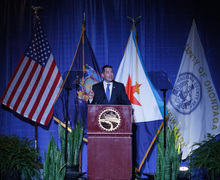Smith: Patricia Arquette’s Oscar mishap can create positive discussion about privilege
The Oscars this year was a platform for political speeches. Director Alejandro González Iñárritu discussed respect for Mexican immigrants, Common and John Legend explained how the message from the film “Selma” is still relevant in America today and Patricia Arquette demanded equal pay for women.
When Arquette accepted her award for Best Supporting Actress in “Boyhood,” in addition to thanking the crew and her family on stage, Arquette said, “It’s our time to have wage equality once and for all and equal rights for women in the United States of America.” This statement may be one-dimensional; all the while it is still universal and fair. But it was her gaffe backstage in the pressroom that had social media abuzz with criticism, except it wasn’t about equal pay.
“It’s time for all the women in America, and all the men that love women and all the gay people and all the people of color that we’ve all fought for to fight for us now,” she said in the press room.
Now there is no debate, this was a senseless answer. Arquette’s intentions were to advocate for all women, instead, she omitted the LGBT and minority communities as if they weren’t affected by the wage gap. But feminists and commentators alike should not have come together to tear Arquette apart. Rather, they should use her comments to discuss the often-invisible fight many LGBT women and women of color deal with on a daily basis.
Roxane Gay, the author of “Bad Feminist” tweeted her frustrations, “The idea that queers & (people of color) have had their time in the struggle spotlight long enough. Eek.” Gay criticized Arquette for overlooking the difficulties that many women of marginalized groups have had to overcome, and for her incorrect assumption that these groups have achieved equality.
These criticisms are valid, yet hasty. Yes, Arquette should not have separated the LGBT community and people of color, but casting her from the feminist realm altogether may do more harm than good. After all, the speech, before her blunder, was heard by millions and was a worthy argument.
Even with a bachelor’s degree, women make 82 cents to every dollar a man makes according to a 2013 study by the American Association of University Women. While the exact number for the wage gap is heavily debated, the one thing that is for certain is that it exists. But the issue that isn’t as easy to recognize is privilege.
Arquette is a white woman — a successful one at that — but in her daily life she may not see how she benefits from her privilege, and how it oppresses others. Many white women, including myself at some points in my past, cannot see their privilege because they are still part of a disadvantaged group. Being a woman comes with challenges, but being a woman from a marginalized group comes with even more obstacles. These cannot be felt or fully understood unless someone takes the time to educate his or herself.
Pointing out the inaccuracies and privilege in Arquette’s statement is necessary to a certain extent, but completely discrediting her hurts the fight for equality. We should use this celebrity mishap as a platform to discuss how one’s privilege — if gone unnoticed — can harm others around them. And in this case, ruin a well-intentioned message.
Julia Smith is a junior newspaper and online journalism and sociology dual major. Her column appears weekly. She can be reached at jcsmit11@syr.edu and followed on Twitter @jcsmith711.
Published on March 2, 2015 at 12:15 am





